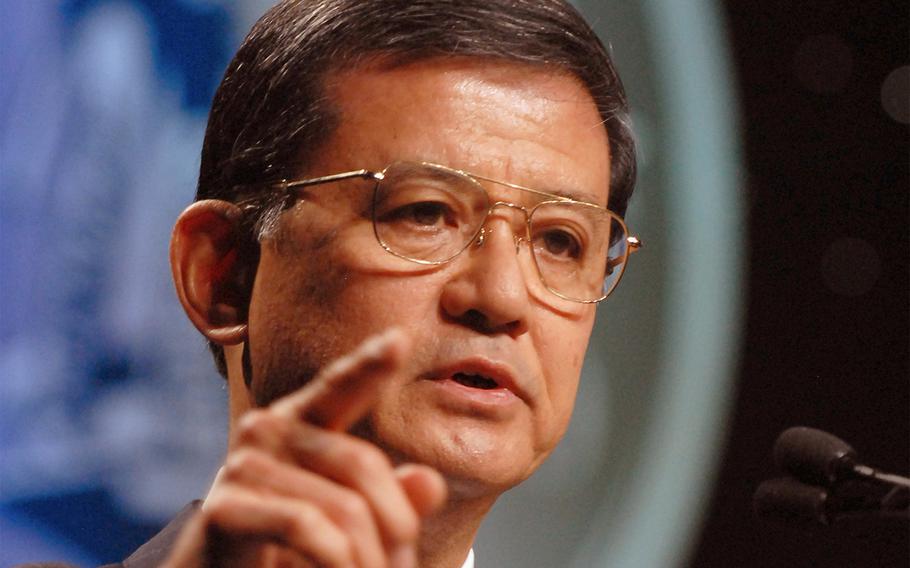
Veterans Affairs Secretary Eric. K. Shinseki speaks at a conference in Washington on Nov. 19, 2009. (Michael J. Carden/U.S. Army)
WASHINGTON — Senators grilled embattled Veterans Affairs Secretary Eric Shinseki Thursday, saying about 50 federal reports in recent years warned of problems long before a scheduling scandal involving veteran deaths exploded last month.
Shinseki said he is “mad as hell” that employees may have falsified records on VA wait times and urged patience from Capitol Hill lawmakers as his agency investigates allegations. But he told lawmakers he has no intention of resigning.
The retired four-star general’s job appears under threat as the Department of Veterans Affairs is rocked by reports of wrongdoing in at least 10 states. In Arizona, allegations surfaced in late April that a Phoenix VA hospital kept a secret list concealing long waits for health treatment while 40 veterans died.
Veterans’ groups and members of Congress have called for Shinseki to resign, and the VA inspector general has launched a probe in Phoenix. That probe will not be completed until August, the IG testified.
On Wednesday, President Barack Obama directed one of his top advisers to assist in a review the VA service, which constitutes the largest integrated health care system in the United States and serves 6.5 million vets per year. White House deputy chief of staff Rob Nabors will be temporarily assigned to the VA to work on a review focused on policies for patient safety rules and the scheduling of patient appointments, officials said Wednesday.
The Associated Press noted that the move is similar to the action the White House took last year when it assigned longtime Obama aide Jeffrey Zients to take over management of the troubled HealthCare.gov website from officials at the Health and Human Services Department. HHS Secretary Kathleen Sebelius later resigned her post.
“If any of these allegations are true in Phoenix and elsewhere … they are completely unacceptable to me, to veterans and the vast majority of VA employees who come to work every day to do their best for those veterans,” Shinseki said. “It is important, however, to allow the inspector general to complete his duty.”
He said the VA has fired or moved employees, including senior officials, in the wake of the scandal and will also spend the next three weeks reviewing its health care system, which has some 1,700 points of entry, and will use those results to make improvements.
Sen. Bernie Sanders, I-Vt., the Senate Veterans’ Affairs Committee chairman, asked the VA secretary why, year after year, new federal reports are published describing access and care problems at the agency’s facilities.
Shinseki said various reports by the IG and Government Accountability Office have been used by the VA to improve its system. The department reacted to long treatment wait times at its facilities by last year requiring that all patients be seen within 14 days of requesting an appointment. But whistleblowers are now alleging that VA employees falsified records to make monthslong waits appear to fall within the two-week rule.
“It doesn’t mean we have solved every issue,” he said. “It does mean we have taken care to address those issues.”
Sen. Richard Burr, R-N.C., asked Shinseki if he was aware of a report that a VA facility in his state double-booked veteran patients for the same appointments and recorded patient visits to “ghost clinics,” facilities that do not exist or are not in operation. He said the allegations were sent in a letter to President Obama.
“I can’t say that I remember it,” Shinseki said.
When asked why he should not resign, the former Army chief of staff and Vietnam veteran said he came to the VA to improve the agency and provide health care to those he had served with over a 38-year military career.
“I intend to continue this mission until I’ve satisfied that goal or I am told by the commander in chief that my time is served,” he said.
The Phoenix VA scheduling scandal that exploded in April coupled with the years of problems left Senators and national veterans’ groups questioning VA leadership. Sen. Jerry Moran, R-Kan., said he had worked with nine directors of the VA over his political career and health care has been deteriorating under Shinseki’s tenure.
“The quality of that service is diminishing and that was not true until recently,” Moran said.
Senators told Shinseki they wanted action.
Sen. John McCain, R-Ariz., who made a special appearance at the hearing Wednesday, said VA beneficiaries should immediately be given more flexibility in choosing where they get treatment to avoid long waits at clinics.
“My fellow veterans can’t wait the many months that it may take to finish [the IG] report,” he said.
The nation’s largest veterans groups also testified, saying they were angered by the allegations that some were dying while waiting for care, and that better leadership was needed.
Tom Tarantino, chief policy officer for Iraq and Afghanistan Veterans of America, said long wait times are not new to the VA but would be solved if “good leaders have the information they need to fix it.”
But instead, the long delays in scheduling health care for veterans appears to have been hidden by VA employees that doctored hospital records, Tarantino said.
“This is indicative of a culture of failed oversight and accountability,” he said.
Veterans expect action to correct the problems to be “taken in weeks, not months” and urged completely independent investigations of the scheduling and health care claims independent of the VA, Tarantino said.
“Veterans need to see the secretary step out in front of this issue and lead,” he said. “We want a proactive secretary, not a reactive one.”